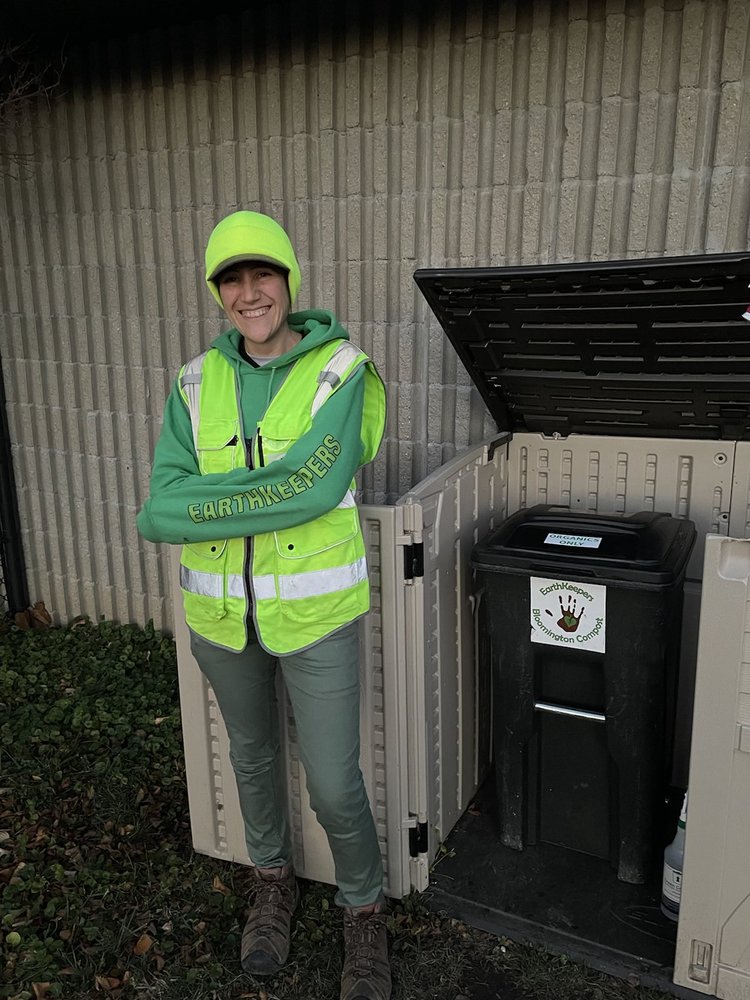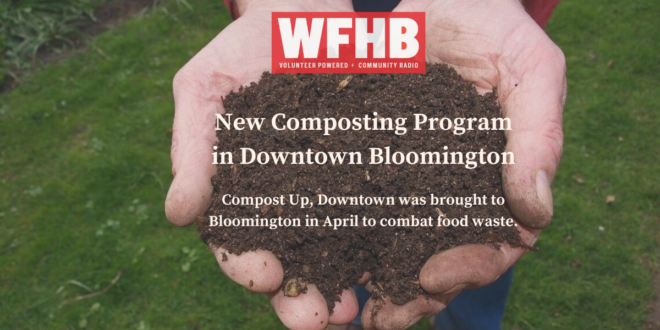Podcast: Play in new window | Download (Duration: 4:31 — 6.3MB)
Subscribe: RSS
Compost Up, Downtown was brought to Bloomington in April to combat food waste.
Restaurants are one of the largest sources of food waste, which lead the City of Bloomington to partner with a local composting company to create a new composting program, according to Andrea Conway, CEO and owner of EarthKeepers, a Bloomington Compost Corporation.
“Helping restaurants reduce food waste reduces the amount of waste that our community sends to the landfill,” Conway said. “Food waste generates Methane when it is sent to the landfill, and Methane has a climate-warming potential 25 times larger than CO2. This Methane affects us all, so we all benefit from mitigating Methane generation.”
The new composting program Compost Up, Downtown provides free trials of composting services for eligible restaurants and food-service businesses located in the Bloomington Entertainment and Arts District. “The Compost Up, Downtown program is an economic development initiative that aims to support Restaurants by covering the initial costs of setting up a composting system and tracking their food waste with the goal of reducing the amount of food waste that they generate and as a result save money,” Conway said. The City of Bloomington’s Department of Economic and Sustainable Development is partnering with EarthKeepers for this program.

According to Conway, EarthKeepers has been providing composting services for the city since 2018. “EarthKeepers is a Bloomington-based Benefit Corporation that provides composting drop-off and collection services by subscription to the Bloomington and Monroe County community,” Lauren Clemens, Assistant Director of Sustainability for the City of Bloomington said. Conway said since EarthKeepers is incorporated as a benefit corporation, it allows them to prioritize the well-being of their community over making a profit. In addition, EarthKeepers is both women-owned and minority-owned. “The women/minority-owned certification is a way to signal that we are inclusive and diverse,” Conway said. “The benefit corporation structure signals that we care about our community.”
“Helping restaurants reduce food waste reduces the amount of waste that our community sends to the landfill,” Conway said. “Food waste generates Methane when it is sent to the landfill, and Methane has a climate-warming potential 25 times larger than CO2. This Methane affects us all, so we all benefit from mitigating Methane generation.”
According to the City of Bloomington’s website, to participate in this program, eligible participants must complete the application and submit it by the deadlines listed on their website. Once a business is approved to participate, EarthKeepers then performs a waste audit at their site. Those participating in the program will be provided with sorting posters, bin labels and more educational materials on composting. “Through this program, participating food-service businesses receive a waste audit, assistance in setting up compost collections, and three months of compost collection,” Clemens said. The program incentive is valued at $5,000 per restaurant and is funded through appropriation as part of the Recover Forward Initiative. Through 2023 this program will offer a three-month composting trial period for 16 places total.
The first cohort of this program started in April and includes Nick’s English Hut, Osteria Rago, the Bloomington Convention Center and Southern Stone. “We are very happy to have iconic Bloomington restaurants in our first cohort,” Conway said. “This really helps set the example and starts the culture change. The program is going very well so far. The reports that we receive from kitchen staff confirm our predictions: composting is not difficult, and it can improve a kitchen’s efficiency significantly.”
The owner of Nick’s English Hut and Osteria Rago, Gregg Rago, said they have been considering compost for a while, so when they heard about this program, they knew it was something they were interested in. “Well, we’ve been thinking about composting for a long time,” Rago said. “We kind of tried it years and years ago because we believe in composting, but for logistics for restaurants, it is very difficult. So it’s been a process we thought about for years and finally, when the city came through with this program, it kind of fit into what we needed. We decided to go for it.”
The biggest concern Rago had going into this trial was the dependability of the people collecting the compost and sanitary issues. “Well, the biggest thing was the dependability of the people collecting the compost, because if you don’t have somebody pick up the compost, then you have a lot of compost sitting around, and we pride ourselves in not having any insects, bugs, rats, anything around,” Rago said. Since their trial began, they have had no issues and Rago was complimentary of EarthKeepers system for composting. “And then they’ve kind of come through with that… it comes in a very sealed, tight sanitary container, where we put our compost before they pick it up. So they’re very timely with it. They’re very clean, very sanitary, and they kind of pretty much checked all the boxes that we needed,” Rago said.
Conway’s advice for restaurants and businesses considering composting is to “Give it a try. Most food-service businesses are hurting right now and are skeptical about adding ‘more complications to their operations’ but this program offers an amazing opportunity for restaurants to save money and do the right thing.”
 WFHB Bloomington Community Radio
WFHB Bloomington Community Radio


